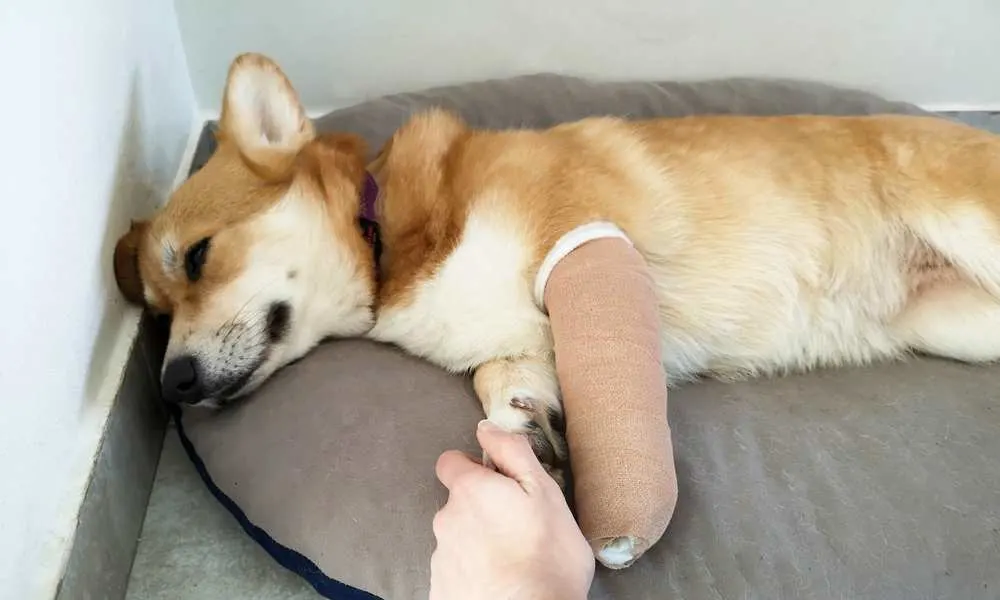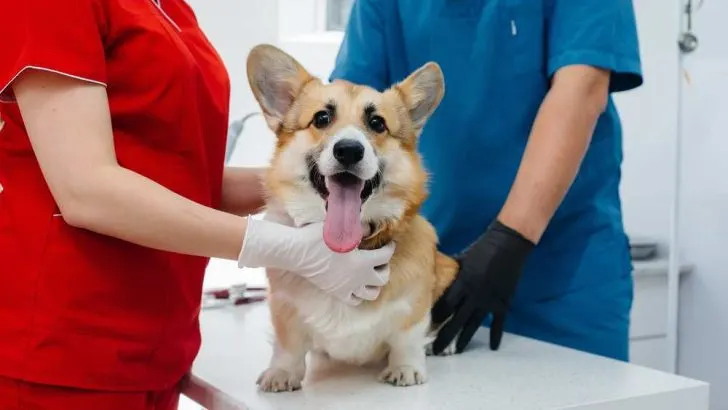There are just a few breeds in this world that are as famous and recognizable as corgis. This is because of many things but one of the biggest things corgis get recognized is because of their short and cute legs.
But do these legs cause any problems for this cute breed? Are corgis prone to joint problems due to their posture and body shape?
The short answer to these questions might be – sometimes. This just means that some corgis can experience joint (mainly hip) problems, but it isn’t inevitable for them to experience these problems in their life span.
As a corgi owner, I have dived into this topic with the intention to come to a conclusion that will help all corgi owners in figuring out what to expect regarding their pet’s joint health.
Let’s dive into this topic and let me help you recognize, treat and prevent (if possible) these problems that your corgi might experience in their lifetime.

Genetic Joint Diseases In Corgis
All dog breeds are likely to develop some health problems according to their genetics. Corgis aren’t an exception to this, unfortunately.
Corgi bodies are recognizable for their short legs and long bodies, but besides being the cutest thing in the world, it will also cause some problems as well. Many people (including corgi owners) don’t know that corgis actually have genetic dwarfism in their DNA that is not only neglected but encouraged by dog breeders.
Achondroplasia is a genetic bone disease that makes the legs of a dog that has this disease shorter and denser. This is the exact reason that corgis do have those recognizable short legs that they use for zooming.
Breeders that specialize in corgis actually see this disease as desirable as the corgis have become famous for their posture and short legs. This means that when people come to buy a corgi and see one that isn’t prone to having as short legs as some other ones there, it’s much less likely that that one will be picked for buying.
For the sheer greediness of the breeders, this genetic disability was not only neglected but was cherished. I do agree that those legs look cute, but this is not the way to deal with a problem that is so widely represented in corgis.
But I digress, the only reason I have mentioned this is to inform all corgi parents and future corgi parents about this because the breeders will probably leave this out if you ask them to tell you a thing or two about the breed you’re looking to buy.
The other reason is that all joint problems come from this fact and nothing else. Even hip dysplasia that the corgis are also prone to (as well as the majority of dog breeds around the world) is caused by the dwarfism that is embedded in their DNA.
There are also some other genetic characteristics of this dog breed that can influence their joint problems. The other biggest one besides achondroplasia is obesity that is unfortunately quite common for this breed.
Obesity puts enormous pressure on your corgi’s joints damaging them and causing some problems for your dog in the long run.
Read Also: Back Leg Problems – Do Corgis Have Leg Problems?

Most Common Joint Problems In Corgis
Probably the most common joint-related problem when talking about corgis is hip dysplasia. They are not alone in this problem as almost all dog breeds are prone to experiencing this disease in their lifetime.
Hip dysplasia is when the ball of the bone in their legs and the socket of their hip don’t align as well and when the ball is likely to dislocate or cause some serious pain by rubbing on the parts of the hip socket that doesn’t have any cartilage on it.
This can happen in a pretty early stage of your pet’s life, but can also develop towards the second half of their life. Depending on when in their life the hip dysplasia occurs, it can be treated with a relative rate of success.
This is done by a simple surgical procedure that your vet can perform on your dog if they are young and strong enough to endure a surgical procedure.
The procedure has a relative rate of success because the vets have performed it so many times it’s become a routine procedure now. By looking at this information, it only shows that many dogs are probably going to develop this disease, and especially corgis.
The second most common joint disease in corgis is elbow dysplasia. This is quite similar to hip dysplasia but the place of it happening is quite different.
Elbows are one of the most used joints in the everyday movement for corgis. When elbow dysplasia develops, your dog won’t be able to make a single step without a feeling of pain that is quite serious even for people. This is also quite easy to resolve with a similar surgical procedure, but the recovery time is much longer than when talking about hip dysplasia.
You should keep in mind that regular vet checkups can save your dog from feeling that pain because when you see them walking funny, it means it’s already late and the dysplasia has taken effect.
Regular checkups mean that your dog will be examined by a professional that can see some things you can’t and will recognize the indicators of early stages of any kind of dysplasia. This is the biggest thing you can do for your dog if you want to help them battle hip or elbow dysplasia.
Other genetic problems brushing your dog’s teeth daily will prevent are periodontal problems that can take a toll on your corgi’s joints. They are not exactly related to joints in the first place.
There are two main examples of this, and it’s obesity and dental disease. Obesity is quite self-explanatory.
When you let your dog gain unnecessary weight, it puts an enormous amount of pressure on your pet’s legs and joints making it harder to run and move overall.
This is the biggest problem that isn’t related to joints but can affect them because most of the pet owners let their dogs get a little bigger when they come into an age where running is not a possibility anymore without realizing they are further endangering their pet’s health in various ways.
The other one is dental disease. Sadly over 80% of dogs combat this disease in their lifetime as their owners don’t pay enough attention to their dental health.
I remember I have always laughed at the videos of people brushing their dog’s teeth with a toothbrush that resembles a toothbrush that a human would use, but now I realize there really is a need for paying much more attention to your pet’s dental health.
When you don’t do this and think that your dog’s dental health will resolve itself, you put your corgi in danger of losing all of its teeth and causing some additional joint problems. Kidneys can also be affected by this as well as your pet’s heart and blood vessels.
Joints particularly are affected by rotting in the teeth, jaw, and gums in your dog’s mouth and when this happens it can hardly be stopped. This is exactly why almost all vets claim that the problems that come from dental diseases can seriously shorten your corgi’s lifespan for up to a few years.
I can’t stress enough how important it is to be involved in your pet’s dental care to prevent this and many other possible complications that develop as a consequence of poor mouth and dental hygiene.

Final Thoughts
As you had a chance to see not all corgis are prone to problems related to joints, but there is a staggering amount of them that do. Even if you exclude the fact that all corgis have dwarfism embedded in their DNA, other problems are more than likely to occur during your pet’s lifetime.
This is why it’s important to regularly take your corgi to checkups to a vet that you know and trust and inform yourself about these diseases that pose a potential threat to your beloved pet.
Genetics isn’t something that we can choose on and decide if we want them or not, so you shouldn’t stress about that part of this story, but rather take your corgi for long walks and let it run so the nature of their strong bodies does the rest instead of you.
Dental hygiene is quite important as well as a well-balanced diet to prevent any joint problems that might occur as a result of these bad habits that at the first glance seem to have nothing to do with your pet’s joints.
In the end, I would just like to advise you that even if your dog develops a disease or a problem that is related to joints – you should be strong and responsible as an owner and take action regardless of the cost or time spent on it.
You need to remember that your dog’s life depends on you and that they look at you as a parent of some sort so you have to take action whenever it’s needed to help your pet overcome a disease regardless of the magnitude or consequences.

